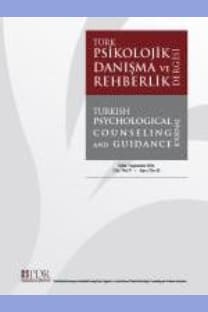Üniversite Öğrencilerinin Psikolojik İyi Olma, Duygusal Zekâ ve Sosyal İyi Olma Düzeyleri Arasındaki İlişkilerin İncelenmesi
Duygusal Zekâ, Psikolojik İyi Olma, Sosyal İyi Olma
An Investigation of Psychological Well-Being, Emotional Intelligence and Social Well-being Levels of University Students
___
- Akın, A. Demirci, İ., Yildiz, E., Gediksiz, E. & Eroglu, N. (2012, May). The Short form of the Scales of Psychological Well-being (SPWB-42): The Validity and Reliability of the Turkish Version. International Counseling and Education Conference 2012 (ICEC 2012), May, 3-5, İstanbul, Turkey.
- Akın, A., Demirci, İ., Çitemel, N., Sarıçam, H. & Ocakçı, H. (2013, May). Sosyal İyi Olma Ölçeği Türkçe Formu’nun Geçerlik ve Güvenirliği. 5. Ulusal Lisansüstü Eğitim Sempozyumu, Mayıs, 10-11, Sakarya, Türkiye.
- Asher, S. R., & Wheeler, V. A. (1985). Children's Loneliness: A Comparison of Rejected and Neglected Peer Status. Journal of Consulting and Clinical Psychology, 53(4), 500. https://doi.org/10.1037/0022-006X.53.4.500
- Austin, E. J., Saklofske, D. H. & Egan, V. (2005). Personality, Well-being and Health Correlates of Trait Emotional Intelligence. Personality and Individual differences, 38(3), 547-558. https://doi.org/10.1016/j.paid.2004.05.009
- Austin, E. J., Saklofske, D. H., Huang, S. H., & McKenney, D. (2004). Measurement of trait emotional intelligence: Testing and cross-validating a modified version of Schutte et al.'s (1998) measure. Personality and individual differences, 36(3), 555-562. https://doi.org/10.1016/S0191-8869(03)00114-4
- Blum, H. (1976). Expanding Health Care Horizons. Oakland, California: Third Party Associates.
- Deci, E. L., & Ryan, R. M. (2008). Facilitating optimal motivation and psychological well-being across life's domains. Canadian psychology/Psychologie canadienne, 49(1), 14. https://doi.org/10.1037/0708-5591.49.1.14
- Gohm, C. L., Corser, G. C., & Dalsky, D. J. (2005). Emotional Intelligence under Stress: Useful, Unnecessary, or Irrelevant? Personality and Individual Differences, 39, 1017–1028. https://doi.org/10.1016/j.paid.2005.03.018
- Guerra-Bustamante, J., León-Del-Barco, B., Yuste-Tosina, R., López-Ramos, V. M., & Mendo-Lázaro, S. (2019). Emotional Intelligence and Psychological Well-Being in Adolescents. International journal of environmental research and public health, 16(10), 1720. https://doi.org/10.3390/ijerph16101720
- Göçet, E. (2006). Üniversite Öğrencilerinin Duygusal Zeka Düzeyleri ile Stresle Başaçıkma Tutumları Arasındaki İlişki. Yayımlanmamış Yüksek Lisans Tezi. Sakarya Üniversitesi Sosyal Bilimler Enstitüsü, Sakarya.
- Kahneman, D., Diener, E., & Schwarz, N. (1999). Foundations of Hedonic Psychology: Scientific Perspectives on Enjoyment and Suffering. Russel Sage Foundation, New York.
- Karasar, N. (2003). Bilimsel Araştırma Yöntemi. (12. Basım). Ankara:Nobel Yayıncılık.
- Keyes, C. L. M. (1998). Social Well-being. Social Psychology Quarterly, 61, 121-140. https://doi.org/10.2307/2787065
- Keyes, C. L. M., Shmotkin, D. & Ryff, C. D. (2002). Optimizing Well-being: The Empirical Encounter of Two Traditions. Journal of Personality and Social Psychology, 82, 1007-1022. https://doi.org/10.1037/0022-3514.82.6.1007
- Lopes, P. N., Brackett, M. A., Nezlek, J. B., Schutz, A., Sellin, I., & Salovey, P. (2004). Emotional Intelligence and Social Interaction. Personality and Social Psychology Bulletin, 30, 1018–1034. https://doi.org/10.1177/0146167204264762
- Martinez-Pons, M. (1997). The Relation of Emotional Intelligence with Selected Areas of Personal Functioning. Imagination, Cognition & Personality, 17, 3–13. https://doi.org/10.2190/68VD-DFXB-K5AW-PQAY
- Matthews, G., Emo, A. K., Funke, G., Zeidner, M., Roberts, R. D., & Costa, P. T. (2006). Emotional Intelligence, Personality, and Task-induced Stress. Journal of Experimental Psychology, 12, 96–107. https://doi.org/10.1037/1076-898X.12.2.96
- Mayer, J. D., & Salovey, P. (1997). What is Emotional Intelligence? In P. Salovey ve D. J. Sluyter (Eds.), Emotional Development and Emotional Intelligence (s. 3–31). New York: Basic Books.
- Ryan, R. M., & Deci, E. L. (2001). On Happiness and Human Potentials: A Review of Research on Hedonic and Eudaimonic Well-being. Annual Review of Psychology, 52(1), 141-166. http://dx.doi.org/10.1146/annurev.psych.52.1.141
- Ryff, C. D. & Singer, B. (1998). The Contours of Positive Human Health. Psychological Inquiry, 9, 1-28. https://doi.org/10.1207/s15327965pli0901_1
- Ryff, C. D. (1989). Happiness is Everything, or Is It? Explorations on the Meaning of Psychological Well-being. Journal of Personality and Social Psychology, 57, 1069-1081. https://doi.org/10.1037/0022-3514.57.6.1069
- Salovey, P., & Mayer, J. D. (1990). Emotional intelligence. Imagination, cognition and personality, 9(3), 185-211. https://doi.org/10.2190/DUGG-P24E-52WK-6CDG
- Salovey, P., Bedell, B. T., Detweiler, J. B., & Mayer, J. D. (2000). Current Directions in Emotional Intelligence Research. In M. Lewis ve J. M. Haviland (Eds.), Handbook of Emotions (2nd ed), s. 504–520. New York: Guilford Press.
- Salovey, P., Mayer, J. D. & Caruso, D. (2002). The Positive Psychology of Emotional Intelligence. In C. R. Synder ve S. J. Lopez (Eds.), Handbook of Positive Psychology, s. 159–171. Oxford: Oxford University Press.
- Schröder-Abe, M. & Schütz, A. (2011). Walking in Each Other’s Shoes: Perspective Taking Mediates Effects of Emotional Intelligence on Relationship Quality. European Journal of Personality, 25, 155–169. https://doi.org/10.1002/per.818
- Schutte, N. S., Malouff, J. M., Hall, L. E., Haggerty, D. J., Cooper, J. T. & Golden, C. J. (1998). Development and Validation of A Measure of Emotional Intelligence. Personality and Individual Differences, 25, 167-177. https://doi.org/10.1016/S0191-8869(98)00001-4
- Schutte, N. S., Malouff, J. M., Simunek, M., McKenley, J., & Hollander, S. (2002). Characteristic Emotional Intelligence and Emotional Well-being. Cognition and Emotion, 16(6), 769-785. https://doi.org/10.1080/02699930143000482
- Schutte, N. S., Manes, R. R., & Malouff, J. M. (2009). Antecedent-focused Emotion Regulation, Response Modulation and Well-being. Current Psychology, 28(1), 21-31. https://doi.org/10.1007/s12144-009-9044-3
- Shulman, T. & Hemenover, S. (2006). Is Dispositional Emotional Intelligence Synonymous with Personality? Self and Identity, 5, 147–171. https://doi.org/10.1080/15298860600586206
- Sintonen, H. (1981). An Approach to Measuring and Valuing Health States, Social Science & Medicine, 15C, 55-65. https://doi.org/10.1016/0160-7995(81)90019-8
- Waterman, Alan S. (1993). Two Conceptions of Happiness: Contrasts of Personal Expressiveness (Eudaimonia) and Hedonic Enjoyment. Journal of Personality and Social Psychology, 64678-91. http://dx.doi.org/10.1037/0022-3514.64.4.678
- ISSN: 1302-1370
- Başlangıç: 1990
- Yayıncı: -
Ragıp ÖZYÜREK, Nursel TOPKAYA, Abdulkadir HAKTANIR, Zeynep HAMAMCI, Ahmet CAN, Baki DUY, Süleyman AKÇIL, Olcay YILMAZ
Psikolojik Danısma ve Rehberlik Öğrencilerinin Profesyonel Yardım Arama Tutumları
Kübra CİVAN, Özlem HASKAN AVCI
Bilge FİDAN, Nergüz BULUT SERİN
Özerklik Desteği ve Çocukların Okula Bağlılığı: Motivasyonun Aracılık Rolü
Ayşe AYAZ, İsmail Hakkı TOMAR, Gürhan CAN, Seydi Ahmet SATICI
Ercan KOCAYÖRÜK, Tugay TUTKUN, Hamide GÖZÜ, Ömer Faruk ŞİMŞEK, Emin ALTINTAŞ
Eğitim Fakültesi Öğrencilerinde Bölüm Memnuniyetinin Yordayıcıları
Yılmaz HASRET, Hülya ŞAHİN BALTACI
Evlilikte Bağlanma Yaralanmaları Ölçeği Geliştirme, Geçerlik ve Güvenirlik Çalışması
Çevrimiçi Trollük Ölçeğinin Geliştirilmesi: Geçerlilik ve Güvenilirlik Çalışması
